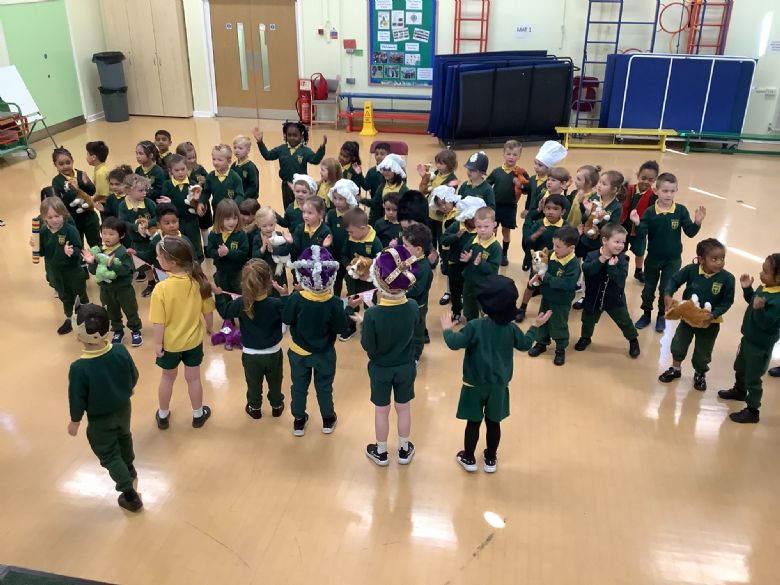Early Years

Intent
Our aim in the EYFS is to build strong foundations rooted in academic success, to support children’s personal, social and emotional development so that they feel safe and secure as well as moral and spiritual development. We offer a balance of child-initiated and adult-led learning, using continuous play and small group activities. We emphasise personal, social and emotional development and communication and language in the nursery. Our enabling environment and warm, skilful adult interactions support the children as they begin to link learning to their play and exploration. As the pupils move into Reception, we invest time and energy into helping pupils set and reflect on their own goals by aiming high and developing a love for learning.
Implementation
-
To provide a safe and caring environment to enable children to learn how to work, play and co-operate with others.
-
To help children acquire self-esteem and a sense of identity, to ensure that they feel included, secure and valued.
-
To help children develop a knowledge and understanding of their environment by providing opportunities to investigate, explore and question.
-
To develop positive attitudes to learning, self-motivation, questioning and independence.
-
To enable children to communicate effectively through talking, listening, reading and writing.
-
To develop an awareness of the needs of others and an understanding of what is right and what is wrong.
-
To offer a broad and balanced curriculum which covers all the areas of learning and experience and enables each child to reach his/her full potential whilst fostering enjoyment in learning.
-
Using high quality questioning and interactions to check children’s understanding and address misconceptions.
-
Developing an effective and engaging environment that is set up so that children can access all areas of learning both inside and outside at any one time.
-
To develop a partnership with all those who are involved in the development of the child.
Suggesting home learning opportunities with information about what has been taught, allowing parents to build on their child’s school experiences at home.
Impact
An integral aspect of the curriculum is that children are prepared for the future – during their time in school, they become fantastic role models and the very best version of themselves. Their individual identity is valued, and our children are kind and caring while also aspiring to be the best that they can be in whatever area they choose to pursue. We believe that every child is unique – they all have the potential to achieve; and our broad, varied curriculum allows every child to excel now and in the future based upon their own personal strengths, interests and core values. We strive to ensure that our children’s progress across the EYFS curriculum is good from their varied starting points. The broad and balanced curriculum design ensures that the needs of individual children, including EAL, SEND and disadvantaged, and small groups of children can be met within the environment of high quality first teaching supported by targeted interventions where appropriate. We prepare children and help them with the transition from Nursery to Reception and from Reception to Year 1.
Curriculum
The learning experiences within our Early Years are linked to the seven areas of learning and development within the EYFS. These areas are split into three prime areas and four specific areas. The three prime areas are those which the children should develop first and are considered most essential for the healthy development and future learning of our children.
The Prime areas are:
-
Personal, Social and Emotional Development – involves helping children to develop a positive sense of themselves and others; to form positive relationships and develop respect for others; to develop social skills and learn how to manage their feelings; to understand appropriate behaviour in groups; and to have confidence in their own abilities.
-
Communication and Language – involves giving children opportunities to experience a rich language environment; to develop their confidence and skills in expressing themselves; and to speak and listen in a range of situations.
-
Physical Development – involves providing opportunities for young children to be active and interactive; and to develop their co-ordination, control, and movement. Children must also be helped to understand the importance of physical activity, and to make healthy choices in relation to food.
The Specific Areas are:
-
Literacy – the early teaching of literacy involves encouraging children to link sounds and letters and to begin to read and write. Children are given access to a wide range of reading materials (books, poems, and other written materials) to ignite their interest.
-
Mathematics – the early teaching of mathematics involves providing children with opportunities to develop and improve their skills in counting, understanding and using numbers, calculating simple addition and subtraction problems; and describing shapes, spaces, and measures.
-
Understanding the World – this involves guiding children to make sense of their physical world and their community through opportunities to explore, observe and find out about people, places, technology and the environment.
-
Expressive Arts and Design – this involves enabling children to explore and play with a wide range of media and materials, as well as providing opportunities and encouragement for sharing their thoughts, ideas and feelings through a variety of activities in art, music, movement, dance, role-play, and design and technology.
Useful links:
Early Years Topics
Upper Early Years Long Term Plan
Lower Early Years Long Term Plan
Progression
Early Years Framework
Development Matters
Useful Websites:
Number Blocks
Oxford Owl
Maths & English Games

